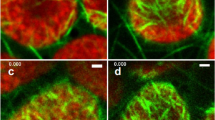Abstract.
The apoplastic pH of guard cells probably acidifies in response to light, since light induces proton extrusion by both guard cells and epidermal leaf cells. From the data presented here, it is concluded that these apoplastic pH changes will affect K+ fluxes in guard cells of Arabidopsis thaliana (L.) Heynh. Guard cells of this species were impaled with double-barrelled microelectrodes, to measure the membrane potential (Em) and the plasma-membrane conductance. Guard cells were found to exhibit two states with respect to their Em, a depolarized and a hyperpolarized state. Apoplastic acidification depolarized Em in both states, though the origin of the depolarization differed for each state. In the depolarized state, the change in Em was the result of a combined pH effect on instantaneously activating conductances and on the slow outward rectifying K+ channel (s-ORC). At a more acidic apoplastic pH, the current through instantaneously activated conductances became more inwardly directed, while the maximum conductance of s-ORC decreased. The effect on s-ORC was accompanied by an acceleration of activation and deactivation of the channel. Experiments with acid loading of guard cells indicated that the effect on s-ORC was due to a lowered intracellular pH, caused by apoplastic acidification. In the hyperpolarized state, the pH-induced depolarization was due to a direct effect of the apoplastic pH on the inward rectifying K+ channel. Acidification shifted the threshold potential of the channel to more positive values. This effect was accompanied by a decrease in activation times and an increase of deactivation times, of the channel. From the changes in Em and membrane conductance, the expected effect of acidification on K+ fluxes was calculated. It was concluded that apoplastic acidification will increase the K+-efflux in the depolarized state and reduce the K+-influx in the hyperpolarized state.
Similar content being viewed by others
Author information
Authors and Affiliations
Additional information
Received: 28 April 1997 / Accepted: 10 November 1997
Rights and permissions
About this article
Cite this article
Roelfsema, M., Prins, H. The membrane potential of Arabidopsis thaliana guard cells; depolarizations induced by apoplastic acidification. Planta 205, 100–112 (1998). https://doi.org/10.1007/s004250050301
Issue Date:
DOI: https://doi.org/10.1007/s004250050301




